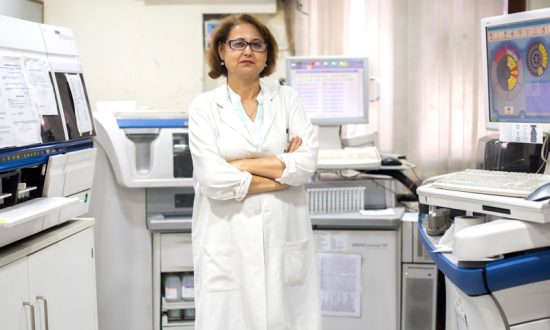Dr. Angeli Misra is Director, Lifeline Laboratory – one of the premier advanced pathology laboratories of Delhi-NCR region. She brings with her an enormous experience of technical and service expertise spanning over 34 years in clinical pathology and 26 years as chief administrator and torchbearer in raising Lifeline Laboratory to meet the highest international standards.She has exhibited exceptional proficiency in Histopathology, Cytology, Microbiology, Biochemistry, Immunology, Oncology, Hematology & Clinical Pathology.
Molecular diagnosis has emerged as an important tool for the diagnosis and management of communicable or contagious diseases (infectious conditions like viral infections e.g. influenza, SARS, Covid-19, HPV, HIV/AIDS, Zika, H1N1, herpes, chickenpox, measles, etc.; fungal and bacterial infections like cholera, pneumonia, tuberculosis, mucormycosis, plague, tetanus, meningitis, leprosy, etc.; and parasitic infections like malaria, dengue, chikungunya, etc.), as well as non-communicable diseases (non-infectious) like diabetes, hypertension, cardiovascular diseases, autoimmune disorders and diseases like thyroid and lupus, cancer, Parkinson’s disease, osteoarthritis, cataract, Alzheimer’s disease, etc.
The Covid-19 pandemic exposed a plethora of problems, shortcomings, and weaknesses of molecular testing in the labs. It brought into sharp focus the lacunae in the field of molecular diagnosis and the lack of proper and acquirable equipment and poor availability, this further revealed an inability to increase the reagent capacity at the earliest. Many labs lacked the proper lab environment and faced considerable difficulties in acquiring adequate personal protection kits for their technicians, consisting of goggles, gloves, n-95 masks, and PPE kits to lower their risk of getting infected during testing and analysis. In addition to that, lab technicians and professionals were under tremendous stress and showed signs of acute exhaustion due to the sudden surge in the demand for tests.
While there has been a rapid advancement in the manufacturing of molecular equipment and reagents, non-Covid-19 research and diagnosis have taken a back seat. Non-Covid-19 research suffered due to social distancing protocols and the directing of all available resources and equipment towards Covid-19 research – especially for academic institutions and hospital-based clinical research. It is so because much of the molecular testing being carried out today is only focusing on grappling with the identification, testing techniques, and tracking of the Sars-CoV-2 virus and its mutating variants like alpha, delta, delta plus, etc. and the effect and efficacy of vaccines in developing and eliciting adequate antibodies against the infection caused by them.
The Covid-19 pandemic has exposed the need for more sensitive and specific tests with a shorter turnaround time to diagnose inflammation (particularly in the respiratory organs, heart, gastrointestinal tract, and kidneys) and the body’s immune response to vaccines. Moreover, the pandemic has also highlighted the capacity for quick and efficient personnel training of lab technicians. The availability of increasing data on the subject is sure to act as a catalyst for further advancements in research in understanding and developing improved testing techniques and protocols (as many as 19 methods for testing and detecting the Sars-CoV-2 virus, including RT-PCR, LAMP, IgG, IgM, IgA, etc. were devised until now, of which 11 were nucleic acid-based protocols and 8 were antibody-testing kits based on both nasopharyngeal, oro-pharyngeal swab and serological method of testing, besides other methods involving broncho-alveolar lavage from the lower respiratory tract, rectal swabs, and fecal testing by stool culture as well).
The Covid-19 pandemic has had some beneficial effects too, as these trying times have revealed a rapid development in the RT- PCR instrumentation field as well as a significant growth in the capacity to produce the reagents in large volumes. These can be used in the diagnosis of non-Covid-19 infections, as well as non-infectious conditions, both now, as well as in the future. Molecular testing has attracted large corporate funding and investment despite the economic crises faced the world over, thereby providing a huge leap in opportunities and incentives for fundamental research, to enable better testing techniques, improved instrumentation, better data analysis methods, upgrading to better types of equipment and improving the standardized informatics systems in the field of molecular diagnostic science on the whole. Striving for increased knowledge will not only ensure better preparation in a similar future pandemic crisis scenario but also greatly benefit the detection and diagnosis of non-communicable diseases as well.
The lessons learned from the Covid-19 pandemic in the field of Molecular Medicine have shown that the diagnostic tests and reagents can be fabricated in a short period of time. Besides this, developments in the field of instrumentation have proved that it can be made simpler and easily available and is user and lab-friendly too. Much of the equipment does not now require the stringent structural changes required in the laboratory. Hence, employing the technique of molecular diagnostics is easily made possible in smaller and mid-size laboratories for rapid and effective diagnosis, thereby bringing this technology closer to the common man.
The costs of molecular diagnosis and the turnaround time have also been seen to be reduced, making it economically viable for all sections of society. Hence, post the Covid-19 pandemic, it has become easier to diagnose some complex infections within a smaller period of time, with lesser false negatives and false positives. In short, the Covid-19 pandemic has brought great advancements in the field of molecular diagnosis and also enabled them to make it easily available to the common man. Quick detection and diagnosis among both symptomatic and asymptomatic subjects have gone a long way in controlling the spread of infection and checking the number of fatalities.


